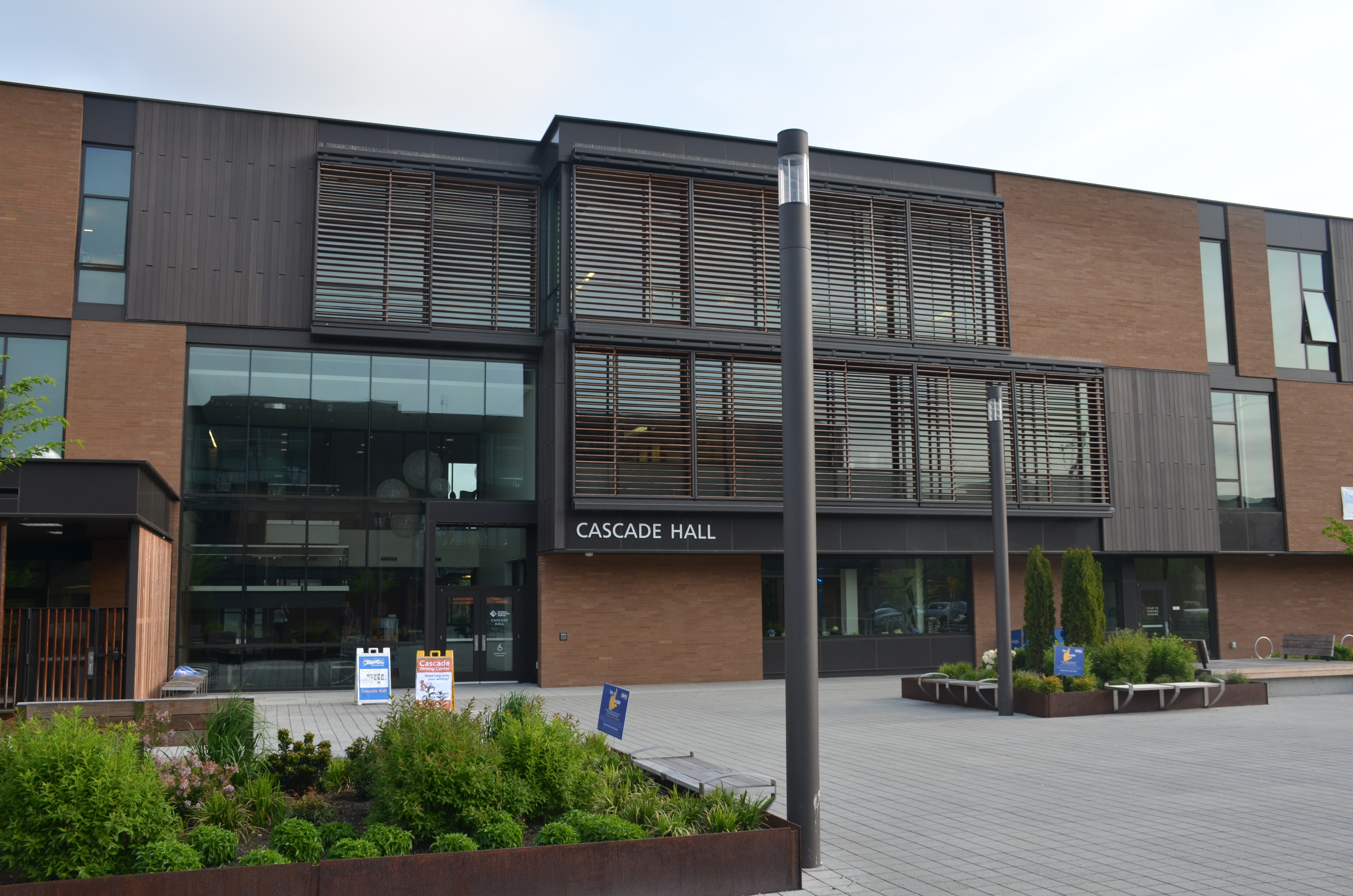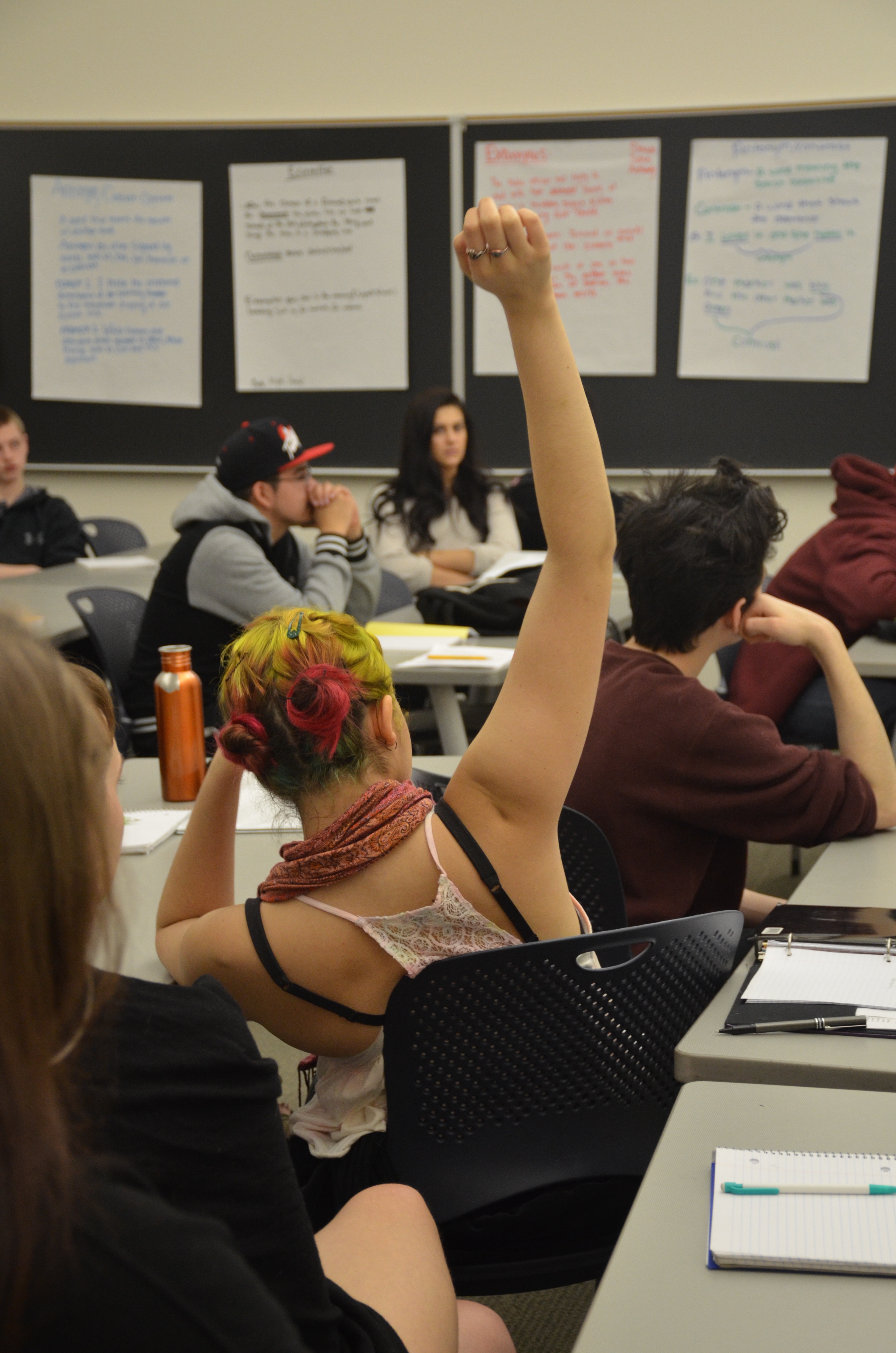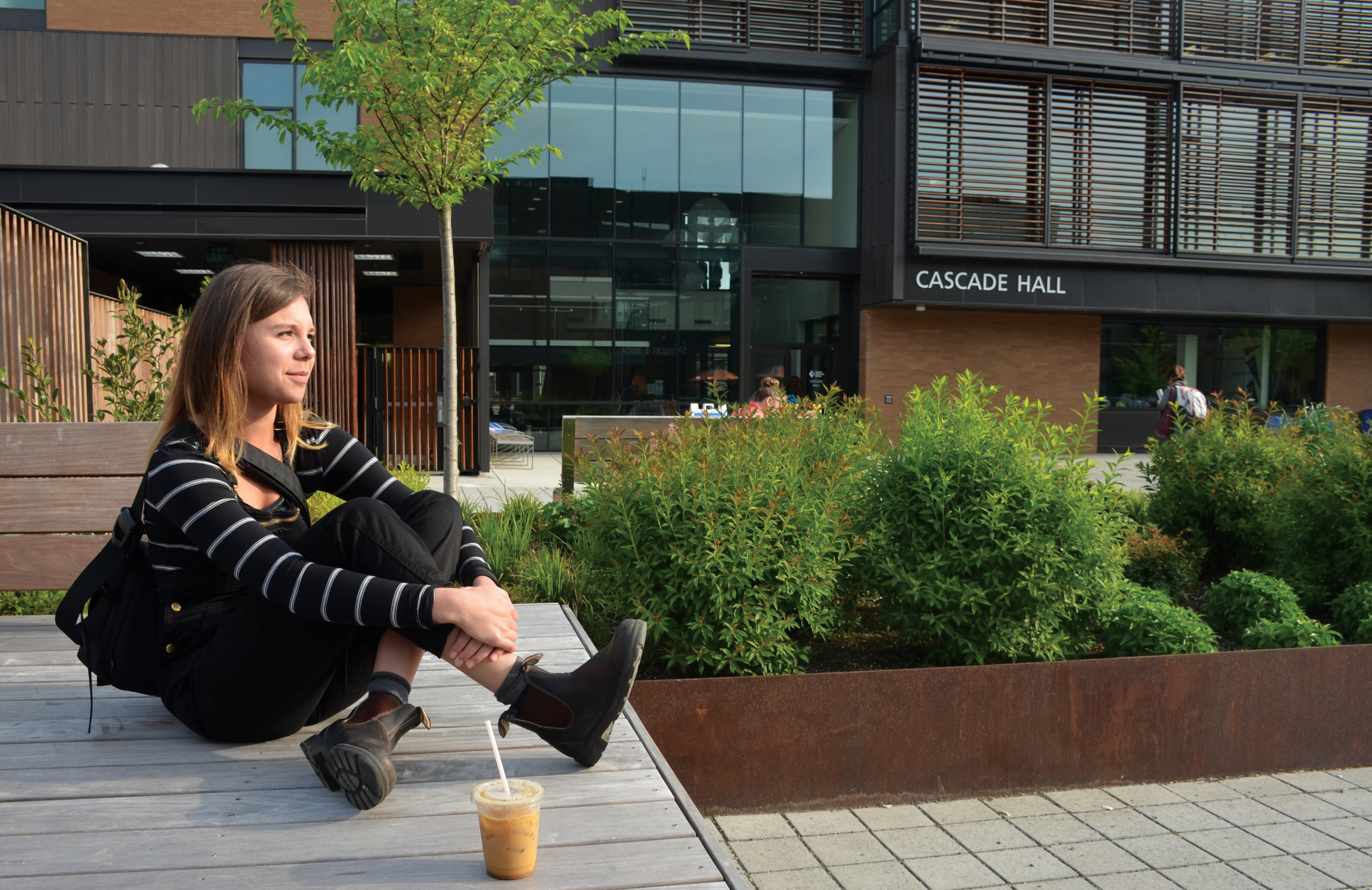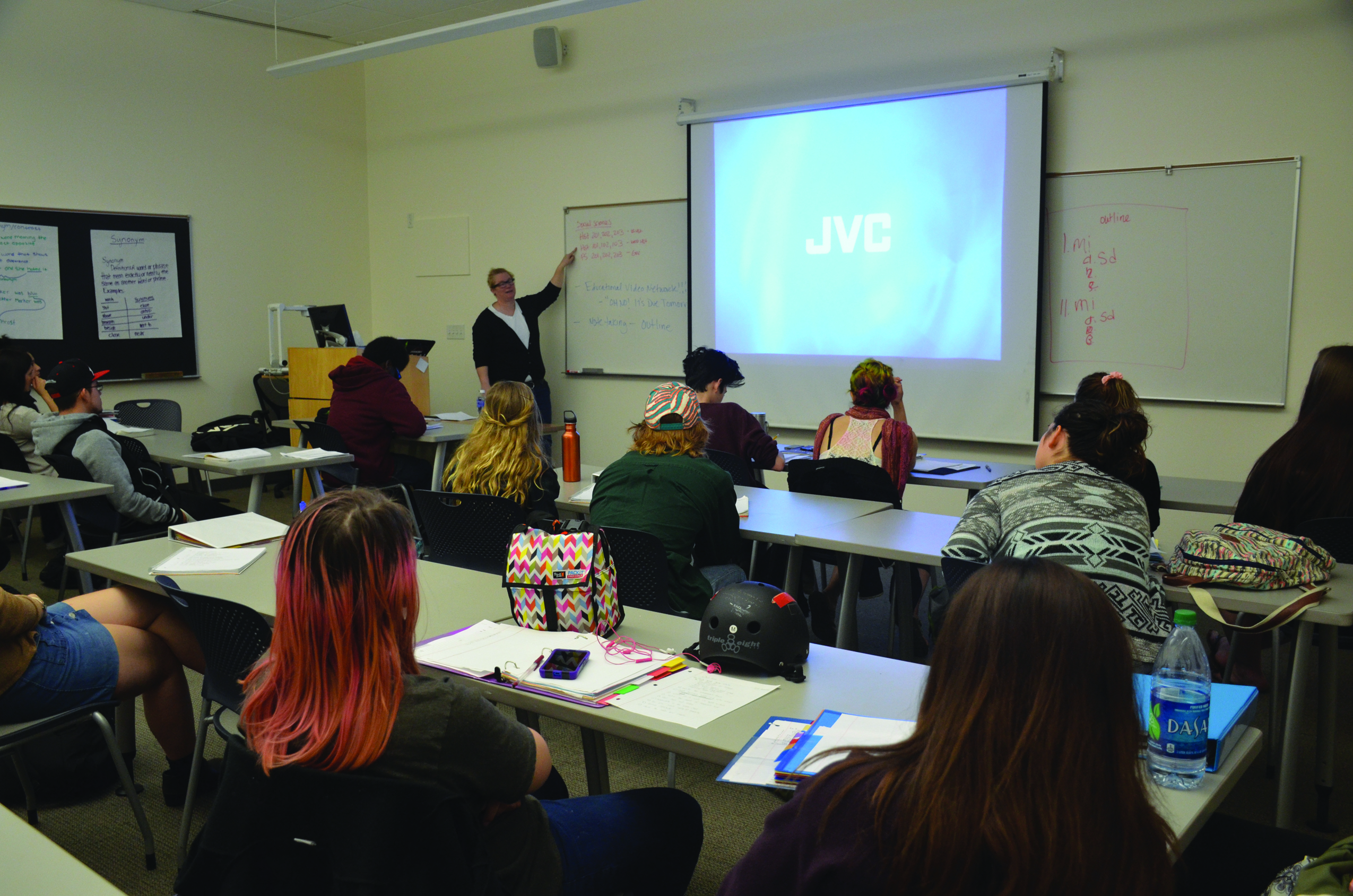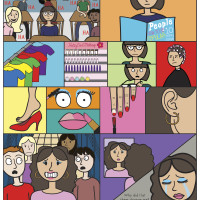Tobias Rubel’s day starts out a little differently than most.
Rather than sitting down at his desk in a high school classroom and logging an eight-hour day, Rubel, 18, spends segments of his day at Portland Community College’s Cascade Campus.
When most Grant students have skinny Mondays, rushing from class to class after the 44-minute periods, Rubel spends a chunk of time in his Spanish class. On Tuesdays, his day starts just about an hour before Grant gets out, and he’s in class until the evening hours.
Rubel is a student in PCC’s Gateway to College program. He left Grant with few credits and a low GPA, a result of both a debilitating illness and a personality that did not perfectly mesh with conventional schooling.
Several students at Grant have opted for the program, which allows them to earn both college and high school credit as they work toward a diploma. Students go to Gateway for a variety reasons, but the perception of their leaving conventional high school is often the same.
Alternative education is commonly viewed as a place for the misfits, the losers. Rubel has faced this viewpoint and chalks it up to a lack of understanding about the benefits of alternative education options.
Raised by his mother, Angela Rubel, he was pushed to value education. She went to Williams College and came from a family that always saw college as a necessary step.
He was born in Northern California, but moved to a small town called Durango, Colorado with his mother and brother when he was 2. Part of the reason for the move had to do with the education of his brother, Eli, who is about nine years older than Tobias. The town, which was nestled in the Rocky Mountains was, Rubel reflects, a place rife with outdoor adventures. On the cross country team, Rubel would literally run up a nearby mountain, and the town was already at 6,800 feet altitude. But, he says as a self-confessed city kid, “It’s a great place to be young. It’s a boring place to be a high schooler.”
As Rubel was heading into eighth grade, he and his mother decided to move, this time to Portland. Again, education motivated their move.
Angela Rubel, a substitute teacher in the school system in Durango, noticed what she describes as a breakdown in communication between the school system’s administrators and the teachers. She could see the effects on the students who were a year older than Tobias, and they weren’t positive.
Says Rubel: “My mother and I both felt that Portland would be a place with more opportunity and more interesting experiences.”
However, within weeks of landing in the big city, Rubel became very sick. No one in the Portland area could treat the autoimmune disorder he developed, and so the pair had to make monthly commutes to California.
Rubel had to use a wheelchair, but the school he attended – Sabin – didn’t have an elevator. He stayed home and was tutored.
Originally, the sickness did not have a huge impact as far as Rubel’s schooling was concerned. He passed the eighth grade benchmark tests fairly easily.
But freshman year at Grant was a different story for Rubel, who had to receive regular IV infusions and was still in a wheelchair. Rubel could only take a schedule of four classes and began to fall behind in credits.
While he eventually got out of the wheelchair several months into freshman year and his health began to slowly improve, Rubel still felt that Grant wasn’t quite the place for him. He found the coursework sometimes to be tedious, and his grades were – by his own admission – “mediocre.”
By sophomore year, he was overall healthier, but his grades dipped even more. Remembers Rubel: “I didn’t feel like I was working towards my goals.”
Midway through his junior year, it became clear that graduating on time was highly unlikely. Rubel had a GPA of 2.1 and only 8.5 credits. It occurred to him that he should look for alternative options.
Right when Rubel became serious about leaving, the potential for a teachers’ strike was in full effect, increasing his feelings about regulations put on teachers in a public school setting.
Rubel began to look around for alternatives. Angela Rubel remembers being a “passenger” in that particular instance. That didn’t bother her, though. In fact, she has always encouraged her kids to do what they saw fit, especially when it came to school, saying, “I think that any way a child can learn is the way that’s great.”
Eventually, Rubel came across the Gateway program through a friend who had previously transferred there from Grant and enjoyed it.
The program itself was founded at the turn of the millenium out of a previous PCC program. Funded by a grant from the Bill and Melinda Gates Foundation, it was branded “Gateway to College.”
At the time, it was the first of its kind, says Pamela Blumenthal, who is the director of the PCC umbrella program that Gateway falls under. It was a co-opted model of the Early College High School Initiative, which was gathering steam in the early 2000s. The Beaverton School District has an early college program, which allows motivated students to take classes for both college and high school credit at PCC.
Gateway aimed to replicate this model, but with a different target audience, according to Blumenthal. “We weren’t looking for students who were on track. We were looking for students who were off track,” she says. These students who would be served by Gateway were a part of a specific niche: maybe they hadn’t been successful so far in the high school setting, but they had the potential to do well if their environments changed.
Gateway’s founders asked, says Blumenthal: “How can this option that’s specifically for high achievers also work for students who struggled and are struggling?”
Teaming up with the Portland Public Schools and five other districts in the metro area, the program was able to provide education and all the benefits of being a regularly enrolled student. PPS also got something out of the deal because it did not have to mark students who left their high schools for Gateway as dropouts.
Through Gateway, students share some of the same benefits of those in early colleges. Namely, they earn both college and high school credit.
During the first term, students take classes with other Gateway students, allowing for a sense of community. Many of these courses are in core subject areas or revolve around life skills.
But once students are ready, they take classes at PCC, with college students and professors. Says Roberto Suarez, a PCC outreach coordinator who is not part of Gateway specifically: “For all intents and purposes, you are a college student.”
This creates a dynamic that is strikingly different than the high school experience. Rubel was especially drawn to the program because of the separation of academics and social life that is characteristic of college. Many in the program pointed out how students in their college classes are paying to be there and thus are motivated to do well.
So are the students within Gateway itself. Duncan Thomas, a new Gateway student who came from another alternative program before settling on PCC’s program, sums it up. “For a lot of people, this is the last chance,” he says.
Even so, Gateway students receive benefits that are not typical of other college students. Each are assigned a college success coach who acts as a mentor throughout the process.
Leaving Grant at the first semester of his junior year, Rubel distinctly remembers the comments he got. Many wondered why he would leave his friends and not get the so-called “high school experience.”
Suarez notes that many see programs like Gateway as less rigorous than high school. This couldn’t be further from the truth, he says, because of the college setting.
Rubel says it’s unfortunate such a stigma exists about alternative education. When people talk harmfully about programs like Gateway, they might dissuade students who could potentially be a good fit.
“For all intents and purposes, you are a college student.” – Roberto Suarez
Often, individuals overlook the vast number of reasons why Gateway, or any alternative education for that matter, might work for someone.
Claire Toland, 17, who transferred to Gateway this past December, left Grant because she wanted to graduate early and felt some of her classes at Grant were inefficient. She could have taken night school, but Gateway seemed to be the best option.
Ketchura Antoine, 17, who found out about Gateway through Rubel, wanted to attend for reasons of diversity and a change of scenery. “I just watched (Rubel) thrive and grow and those opportunities that he had, and I got really excited,” she says.
Antoine, though, had too many credits to attend Gateway. As Blumenthal stresses, “Our programs are for students who are off-track.” Even so, Antoine made an appeal based on knowing Rubel and was able to get in.
The decision was made difficult, though, after she found out she got onto Grant’s Constitution Team. Eventually, she found a way to work out her schedule so she could go to PCC and be on the team. At PCC, she has been able to enhance her civic education by interning for Oregon House Speaker Tina Kotek.
She says she loves the diversity in all of her classes and has learned from people far older than her who come from all walks of life.
Blumenthal rattles off a variety of reasons for students attending. Some are homeless and many others are low-income. Others are recovering from drug or alcohol addiction, and find the high school social pressure too much to handle. Some students simply never thought they were going to receive a diploma and might not even have gone to high school, dropping out in middle school.
Regardless, many are disenfranchised by the school system in one form or another. At a recent “College Survival and Success” class, students discussed the differences between high school and college. The only resounding agreement they came to was that high school was not the place for them, and they hope college and Gateway can change their current paths.
Rubel appreciates the variety of courses because of PCC’s size and breadth, saying, “It’s just like a culture of focusing on the things that you like, that you feel make you unique.”
That’s something that carries throughout all the subject areas, even down to physical education, Rubel says only half-jokingly. He’s taking yoga.
Uniqueness is a value Rubel shares with his entire family. His mom recalls how she raised Tobias with the philosophy that being normal isn’t always a good thing, something that she carried throughout her life. “I had goats instead of dogs. I rode a unicycle instead of a bicycle,” she says.
Rubel currently takes 18 credits, which is the equivalent of a college schedule and a half. Even so, he’s in school for less time than your typical high school student. That’s because the majority of his work and learning occurs outside of class, allowing him to take a more individualized approach to his education.
Being in the program, Rubel has enjoyed immense benefits. Since he started, he’s never gotten anything below an A. But to Rubel, that’s beside the point and always has been: he says the most important thing is that he’s learning a lot.
Angela Rubel is proud of her son for his ability to put his health issues behind him and live his life: “People can go through things that are large like that, and that’s always their reference point. And Tobias doesn’t use it that way,” she says.
His success isn’t entirely unusual for Gateway, which after being started at PCC was replicated throughout the country in 43 community colleges. The program sends 75 percent of its graduates onto college. Because students graduate on average with about 60 college credits, there is a huge incentive to continue on to get an associate’s degree, finish off at PCC, or apply for a transfer.
Rubel will be starting off at Reed College next fall, something he never would have imagined himself doing when he left Grant. He says he probably would have ended up eking his way into a state school.
Rubel settled on Reed after attending a college fair and visiting a class. At the fair, he met a counselor from Reed. Among the suits and ties of other colleges, Rubel felt at home when he saw the Reed counselor was laidback and drinking Kombucha. Uniqueness, again, that struck his eye.
Rubel plans to major in philosophy, something that has gotten a few head turns from people he knows. “What are you going to do for work?” people ask him.
He doesn’t know, but he’s sure he’ll find his way.
After all, his mom was an art history major, and his brother dropped out of photography school.
But they’re perfectly content and successful, Rubel says, because they did what they wanted to do. As long as Rubel charts his own course, just as he did when he took the plunge to attend Gateway, he believes the rest will follow. ◊

